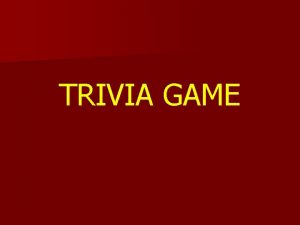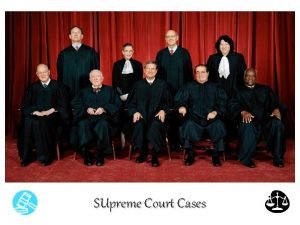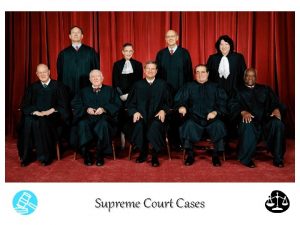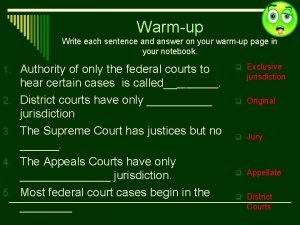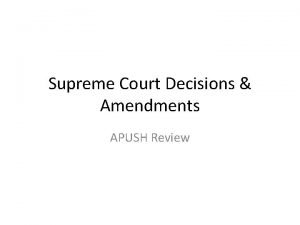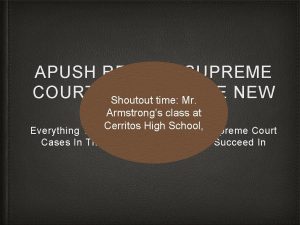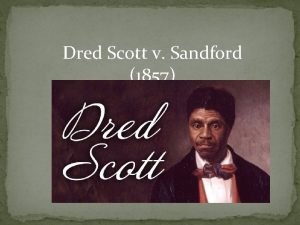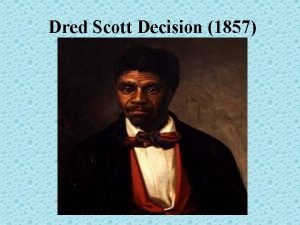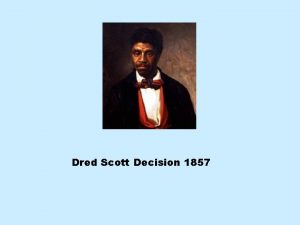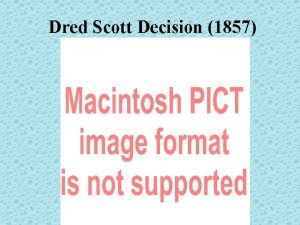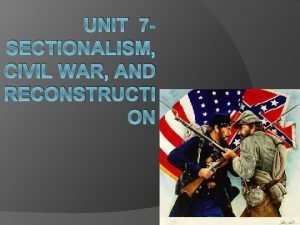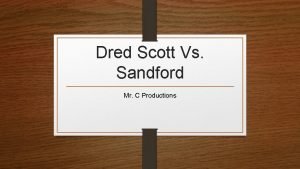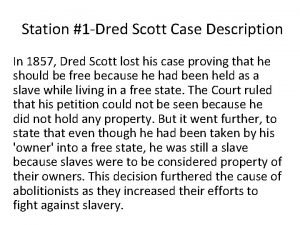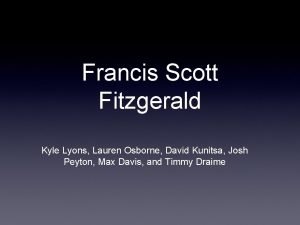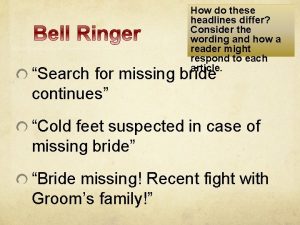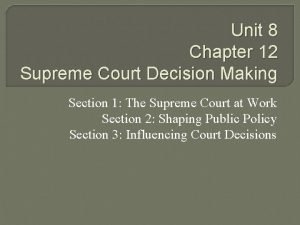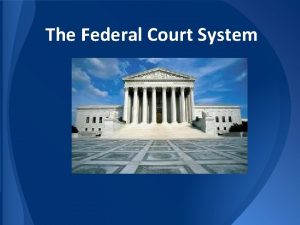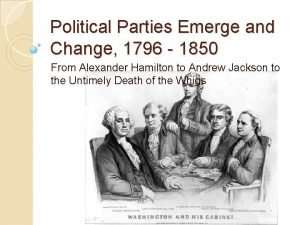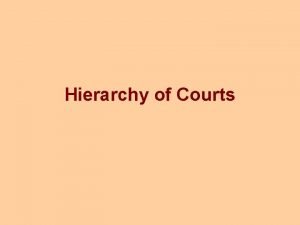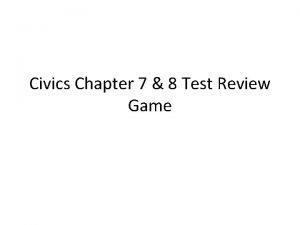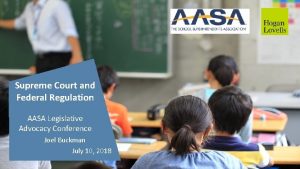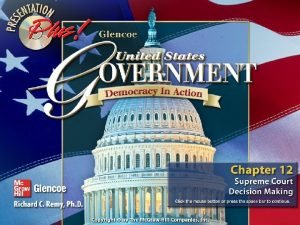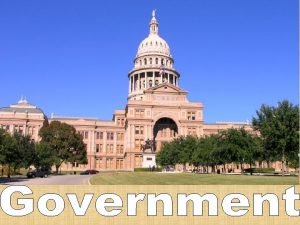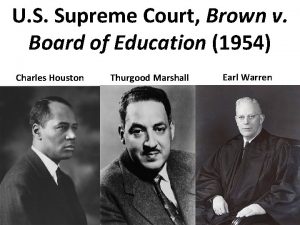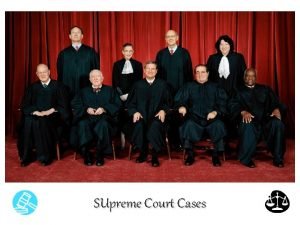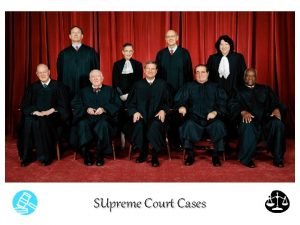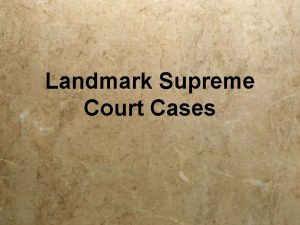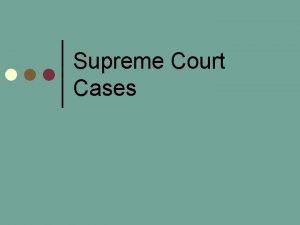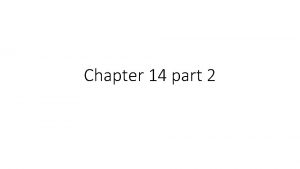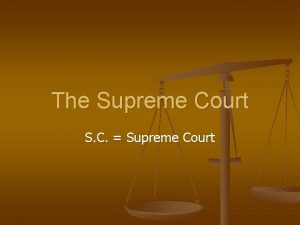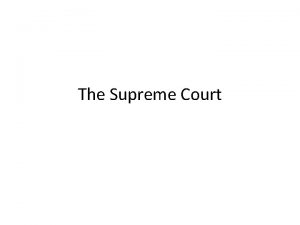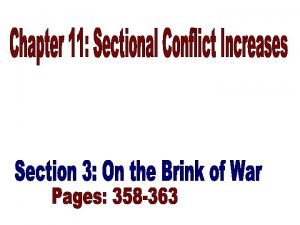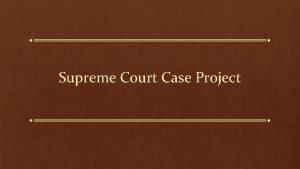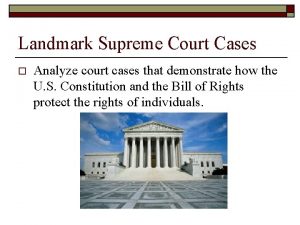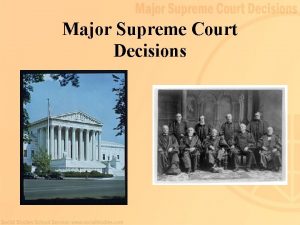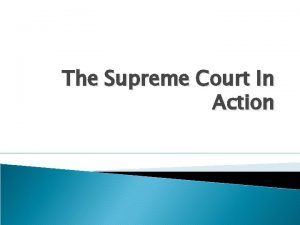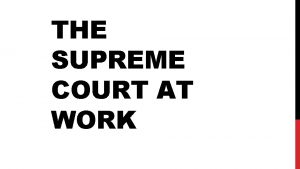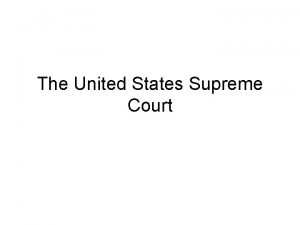Supreme Court Cases KEY CASES PRECEDENTS Dred Scott




























- Slides: 28

Supreme Court Cases KEY CASES & PRECEDENTS

Dred Scott v Sandford - 1856 A slave lived in slave and then free territory subsequently suing for his freedom. The Court decided he was not a citizen and therefore the Constitution did not apply to him His freedom was denied.

Plessy v Ferguson - 1895 The Louisiana state imposed racial segregation was upheld by the Supreme Court. Separate but equal facilities for blacks and whites satisfied the 14 th Amendment according to the justices on the case.

Sweatt v Painter - 1949 H. Sweatt (a black man) applied for admission to the Univ of Texas Law School. UT Law was only open to whites and rejected his application. Sweatt appealed; UT attempted to set up a separate law school facility for blacks. SC decided that even the attempt to open a separate facility would create an unequal situation. UT was in violation of the 14 th Amendment Equal Protection Clause and must admit Sweatt.

Brown v Board of Education 1952 Black children were denied access to public schools attended by white children. Court decided that intangible issues foster and maintain an inherent inequality causing a detrimental effect on minority children. Public school segregation ended.

Mapp v Ohio - 1960 “Exclusionary Rule” is applied Evidence of obscene materials was not allowed after being discovered during an illegal search of Mapp’s home. Police were searching for a fugitive.

Engel v Vitale - 1961 NY Board of Regents authorized a short, nondenominational prayer at the start of each school day. The constituted state approval of a religion and violated the Establishment Clause of the 1 st Amendment.

Gideon v Wainwright -1963 Gideon represented himself after being denied an attorney by Florida. (denied attorney since it was not a capital crime) Initially SC guilty of breaking and entering. decides the 6 th Amendment protects the defendant’s right to an attorney in felony cases at the state level

New York Times v Sullivan 1963 Alabama’s libel law infringed on Freedom of Speech and Freedom of Press protections. 1 st Amendment protects statements, even false ones, unless made with actual malice.

Griswold v Connecticut - 1964 Connecticut law criminalized marital counseling regarding the prevention of conception. The 1 st, 3 rd, 4 th, and 9 th Amendments create a zone/right of privacy in marital relations.

Miranda v Arizona - 1965 Multiple cases decided together. All cases had suspects cut off from the outside world, interrogated without counsel and made to sign statements with counsel present. The statements were inadmissible. Court outlined the specific warnings need to provide suspects. police

Tinker v Des Moines ICSD 1968 Students wore armbands in support of a truce in Vietnam. They were forced to remove the armbands or face suspension. The families sued. Court stated that the armbands represented pure speech and were protected by the 1 st Amendment. The students did not give up this protection by stepping on the school campus.

Clay v United States - 1971 Kentucky denied Clay’s conscientious objector application. Opposed Based It to war in any form upon religious training/belief is sincere The appeal board’s denial was overturned. Court stated no legitimate reasoning was provided.

Furman v Georgia - 1971 Burglar tripped, causing his gun to go off and inadvertently kill one of the residents of the home. Furman The was sentenced to the death penalty. imposition of the death penalty in this case (& 2 others) was deemed cruel and unusual punishment, violating the 8 th and 14 th Amendments

Roe v Wade - 1971 Texas law prohibited abortions in except to save a woman’s life. Roe sued for her right to have an abortion. 14 th Amendment’s protection of the right to privacy provides total autonomy for women’s right to have an abortion in the 1 st trimester. States may intervene in the 2 nd and 3 rd trimesters. https: //www. youtube. com/watch? v=1 q 5 Ag. Cz. PIu. A

Wisconsin v Yoder - 1971 Amish families refused to send their children to school after the eighth grade stating high school attendance was contrary to their religious beliefs. State law required school attendance to age 16. Unanimous court decision said Freedom of Religion outweighed the alleged benefit of attending school for two more years. https: //www. youtube. com/watch? v=Yn. HFKy 5 WRr 0

Buckley v Valeo - 1975 Congress set limits on campaign donations by an individual and required reporting above a certain threshold. Federal Election Commission was created. Court decided Restrictions on contributions did not violate the 1 st Amendment Limits on total campaign expenditures and funds from personal or family resources for your own campaign DID violate the 1 st Amendment.

Regents of UCal v Bakke - 1977 Bakke (white) was denied admission twice to UCal Davis medical school. The school reserved 16/100 places for minority applicants. Court was split but decided any racial quota system violated the Civil Rights Act of 1964. Bakke was admitted.

Hutchinson v Proxmire - 1978 Senator Proxmire’s “Golden Fleece Award” in his newsletter stated Hutchinson’s government funding for his work as a behavioral scientist was a waste of tax money. Hutchinson Proxmire sued for libel. was not protected by the Speech and Debate Clause, but his statements were not libelous.

New Jersey v T. L. O. - 1985 High School student was suspected of having cigarettes. A search revealed marijuana and a list of those owing the student money. The Court decided that the Exclusionary Rule does not apply to searches conducted by school officials.

Texas v Johnson - 1988 Johnson burned a flag protesting Reagan policies in front of Dallas city hall. Sentenced to 1 yr in jail and a $2000 fine. 5 -4 Court decided that burning the flag was a protected form of free speech.

Employment Division v Smith - 1989 Native American counselors at a drug rehab facility ingested peyote as part of a religious ceremony. They were fired and denied unemployment compensation. Court decides in favor of the state. Religious freedom does not allow one to violate valid laws.

United States v Lopez 1994 12 grade student carried a concealed weapon into th his high school. State charges were dismissed and federal charges were brought under the Gun-Free School Zones Act of 1990. Lopez won the case as the possession of the gun had nothing to do with commerce or any economic activity and was out of Congress’ scope of powers.

Boy Scouts of America v Dale 1999 Dale, a homosexual and gay rights activist, had his membership revoked by the BSA. New Jersey public accommodations statute prohibited discrimination such as this. The Court ruled that the BSA was a private organization and was free to associate as they pleased. The New Jersey statute violated their 1 st Amendment rights of free association.

Santa Fe ISD v Doe - 1999 2 families filed suit against Santa Fe ISD over a prayer said at each home football game using the p. a. system. The Court ruled that student led, student – initiated prayer violated the Establishment Clause. It was public speech on government property.

PGA Tour v Martin - 2000 Casey Martin has a degenerative circulatory condition that prevents him from walking golf courses. The PGA Tour denied his request to use a golf cart during qualification. He appealed and won at the district court level. The Court reaffirmed the district court’s decision that the PGA was in violation of Title III of the ADA of 1990 the use of the cart did not “fundamentally alter the nature of the game” f

Board of Education v Earls - 2001 Tecumseh, Ok school district required drug testing for all middle and high school students involved in extracurricular activities. 2 families brought suit claiming a violation of the 4 th Amendment. The Court deemed the policy consistent with the 4 th Amendment due to the policy reasonably serving in the interest of detecting and preventing drug use. (Middle school testing) https: //www. youtube. com/watch? v=Fc 4 vvn 8 Zm. G 4

Lawrence & Garner v Texas 2002 Houston police responded to a weapons disturbance call in a private residence. Lawrence and Garner were engaged in a consensual sexual act. They Court were convicted under Texas law. decided Texas violated the Due Process Clause of the 14 th Amendment.
 Is there a basketball court above the supreme court
Is there a basketball court above the supreme court Supreme court cases graphic organizer answers
Supreme court cases graphic organizer answers Supreme court cases graphic organizer answers
Supreme court cases graphic organizer answers How cases reach the supreme court worksheet answers
How cases reach the supreme court worksheet answers Apush amendments review
Apush amendments review Schechter poultry v us apush
Schechter poultry v us apush Dred scott case define
Dred scott case define Dred scott decision what happened
Dred scott decision what happened Dred scott decision facts
Dred scott decision facts Timeline of dred scott
Timeline of dred scott Civil war and reconstruction achieve 3000 answer key
Civil war and reconstruction achieve 3000 answer key Dred scott vs. sandford 1857
Dred scott vs. sandford 1857 Preston brooks
Preston brooks Who made this
Who made this Kyle fitzgerald death
Kyle fitzgerald death What do these headlines say about how the supreme court
What do these headlines say about how the supreme court Vocabulary activity 12 supreme court decision making
Vocabulary activity 12 supreme court decision making Supreme court justice system
Supreme court justice system Political parties
Political parties Jurisdiction of supreme court
Jurisdiction of supreme court The u.s. supreme court works chiefly as a(n)
The u.s. supreme court works chiefly as a(n) Supreme court does
Supreme court does Supreme court does
Supreme court does Have supreme court
Have supreme court The supreme court
The supreme court Supreme court
Supreme court Supreme court
Supreme court Which of these best summarizes the monroe doctrine?
Which of these best summarizes the monroe doctrine? John marshall supreme court
John marshall supreme court
